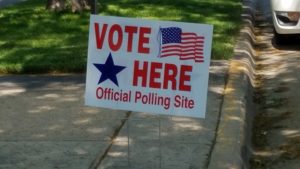
By Dana Hess For the S.D. Newspaper Association
BROOKINGS — This November, South Dakota voters will once again decide on an ethics measure. As with Initiated Measure 22 in 2016, backers of Amendment W say it is a needed safeguard to ensure ethical behavior in Pierre. Opponents say it is a dangerous overreach, giving unchecked power to a new ethics board.
If approved by voters on Nov. 6, the amendment would go into effect on July 1, 2019.
“It’s a bad solution for the problem, even as they define it,” said David Owen, president of the S.D. Chamber of Commerce and Industry. “This is like chemotherapy for the cold.”
The wide-ranging amendment would:
• lower campaign contribution amounts.
• prohibit campaign contributions from being spent on personal use.
• place restrictions on lobbyists. • replace the government accountability board with a new board with broad powers.
• limit the votes necessary for the passage of an initiated measure.
• require voter approval for any changes to the initiated measure or referral process.
According to Attorney General Marty Jackley’s ballot explanation, if it is approved by voters, Amendment W will likely be challenged in court on constitutional grounds.
Voters were angry after the Legislature repealed Initiated Measure 22, according to Mitch Richter, co-chairman of Represent South Dakota.
“They repealed what the citizens had voted in,” Richter said.
The ethics panel in Amendment W has been “supplemented with things the Legislature didn’t go far enough on,” Richter said, referring to ethics bills lawmakers endorsed in the wake of the repeal of IM 22. “We’re one of only seven states that doesn’t have an ethics commission.”
The powerful ethics panel and the amendment’s claim to overrule other parts of the state constitution worries Owen.
“This new article has control over the rest of the constitution,” Owen said. “We don’t have any way for other branches to issue opinions or make changes.”
According to Richter, anyone who disagrees with a decision made by the ethics panel can take their concerns to court.
“That’s a red herring they’re throwing out there,” Richter said of the criticism.
Owen agrees with Jackley, that if it passes, Amendment W is likely to be challenged in court. Owen said a judge must decide if Amendment W has sway over the rest of the constitution or if the document’s 125 years of precedence will rule. According to Richter, Amendment W’s language was written to conform to the rest of the state’s constitution.
“It doesn’t conflict with other parts of the constitution,” Richter said.
Owen admits that South Dakota’s one-party rule may cause some frustration, but as a lobbyist in the state since 1999, he hasn’t seen the widespread corruption that the amendment tries to address.
“In this day and age, I think we have a tendency to confuse disagreement with corruption,” Owen said. “They must show evidence of corruption, and up to this point haven’t.”
Richter points to the list of organizations opposing Amendment W and says that many of them have members who hold contracts with state government. “I think they’re really afraid of transparency and open government,” Richter said. “They don’t want the rules of the game to change.”
